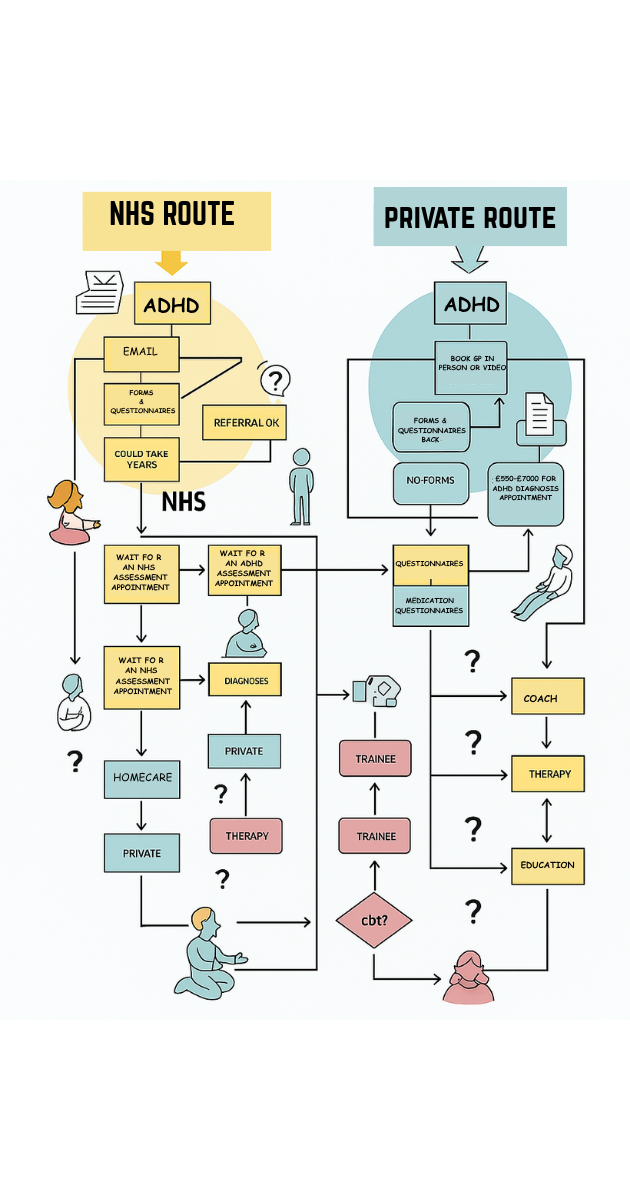We can detect a planet wobbling in deep space, but we still can’t diagnose ADHD in under a year?
If you’ve ever tried to get assessed for ADHD, autism, or any neurodivergent profile, you already know the feeling. The waiting room doesn’t start at the clinic,it starts somewhere in the pits of bureaucracy, red tape, and half-baked systems.
Ask anyone on this wild ride and they’ll tell you: “It took years. YEARS. And it nearly broke me.”
Despite rising awareness, modern tools, and TikTok giving the world a crash course in executive dysfunction, getting an actual diagnosis still feels like trying to get Taylor Swift tickets during a Mercury retrograde. It’s draining, expensive, and borderline humiliating.
So why is it still so hard? Why the wait?
Let’s unpick the very unsexy reality of why so many neurodivergent adults (and their kids) are still getting left behind, even in 2025.
Diagnosis or Treasure Hunt?
We’ve made huge cultural progress in recognising neurodivergence. ADHD, autism, dyspraxia, dyscalculia, they’re no longer whispered about in hushed tones over the school pick-up line. But when it comes to getting officially diagnosed, things hit a brick wall. Often a very pricey, state-sanctioned brick wall.
It’s not about recognition anymore. It’s about access.
And the truth? Access is a mess.
ADHD NHS Test vs. ADHD 360: Does It Matter How You Get There?
In the UK, you’re generally faced with two choices:
- Take the NHS route – Free, but with waiting lists stretching into literal years. And that’s just to get seen. The follow-ups? A whole new queue.
- Go private via clinics like ADHD 360 – Speedier, but comes with a price tag that could make your debit card weep.
Sure, services like ADHD 360 promise faster assessment and more tailored care, and they’re widely used. But there’s a catch: some NHS Trusts or GPs still cast side-eyes at private diagnoses. Not always, but often enough to cause confusion.
Meanwhile, the ADHD NHS Test itself is a mystery to many. It’s not a quick online tick box. It involves interviews, school reports, GP referrals, and sometimes proving you haven’t just self-diagnosed after watching one too many reels about “girl ADHD.”
The World is Waking Up—but the Systems Are Still Asleep
This isn’t just a UK thing. Whether you’re in the US, Australia, Europe or beyond, people are reporting increasing delays, patchy services, and a growing reliance on self-diagnosis.

Yes, awareness is exploding. But awareness without infrastructure just equals… frustration.
One in five people are now believed to be neurodivergent. Yet the systems designed to identify, support and medicate us were built for the one in a hundred. You do the maths.
“If I’d Just Known Sooner…”
Perhaps the worst part of this whole circus is hearing the same heartbreak over and over:
“If I’d been diagnosed sooner, I wouldn’t have spent my childhood thinking I was lazy, rude or broken.”
Late diagnosis isn’t just frustrating, it’s deeply emotional. Many adults go through grief, mourning years of misunderstanding, internalised shame, failed careers or wrecked relationships. It’s not just about getting an answer. It’s about getting your story back.
And then we tell them to wait… again.
The Cost of Clarity
Even if you can get diagnosed, the financial strain is no joke.
- Assessments via private clinics can cost £500–£1,800+.
- Medication trials (because no, they don’t just hand over Ritalin and say “good luck”) require multiple appointments, often not covered by insurance or NHS scripts.
- Add therapy, coaching, or workplace reports, and you’re looking at the neurodivergent version of a mortgage.
For many, it’s simply out of reach. So they wait. And suffer. Or worse, give up.
“Why Can’t They Just Accept Me?”
Here’s the twist: Do you really need that piece of paper?
For some, yes – it unlocks medication, workplace accommodations, or legal protections. But for others, it’s more about validation, language, and finally understanding why you’ve always felt out of sync.
Still, it raises the question: Should I have to prove my struggle to be taken seriously?
No. But the world doesn’t always play fair.
Explaining ADHD Burnout or sensory overwhelm to a neurotypical boss without a formal diagnosis? That’s like trying to explain WiFi to your nan. It’s not your job, but it often becomes your burden.
So What’s the Solution?
Honestly? We need systemic reform, better funding, and proper ND-trained professionals who don’t just google “ADHD in women” during your session.

But while we wait (again), here are some things that help:
- Join ND communities – validation is priceless
- Keep a personal symptom tracker – helps if/when you finally get seen
- Use trusted clinics – ADHD 360, Psychiatry UK, etc. are increasingly recognised and may partner with NHS
- Be open, where safe – some workplaces and schools are becoming more flexible around unofficial ND recognition
Above all: your lived experience is valid, even without the paperwork.
Final Thoughts
In a world where we can deepfake* entire celebrities and track sleep on a ring, it’s absurd that ND people are still waiting 18 months just to be heard.
We’re not asking for shortcuts. We’re asking for sanity.
For speed. For dignity. For the right to not spend the best years of our lives in limbo.
Because when someone finally says “you’re not broken – you’re just wired differently,” it shouldn’t have taken a second mortgage and two years of sobbing in bathrooms to get there.
So, tell me…
Have you tried to get a diagnosis recently? What was your experience like, and what do you think needs to change?
*Deepfake – a video of a person in which their face or body has been digitally altered so that they appear to be someone else, typically used maliciously or to spread false information. (Yeah I recently discovered this term too)




